| Srl | Item |
| 1 |
ID:
166767
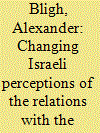

|
|
|
|
|
| Summary/Abstract |
Since 1948/1949 The International Committee of the Red Cross (ICRC) has been synonymous in the Arab–Israeli context with processes of exchanging prisoners and caring for human lives. After the 1967 war the ICRC changed in status from that of a mediator to that of the executive arm of larger forces. The processes leading to the partial demise of the ICRC are clearly identified in retrospect. It has to do with the asymmetry of perceptions between Israel and the organisation. Israel did not agree to the application of the Fourth Convention in the territories. The ICRC believed that this population fell under the Convention and therefore under the ICRC. Furthermore, the ICRC failed in getting the Israeli POWs back home, especially after the conclusion of the War of Attrition in 1970. The resulting feelings eliminated in the Israeli decision makers' minds the role that the ICRC saw for itself in future POW exchange deals. After the 1973 war the ICRC would lose its position as a negotiator, leaving that arena to other international actors.
|
|
|
|
|
|
|
|
|
|
|
|
|
|
|
|
| 2 |
ID:
191933
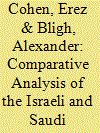

|
|
|
|
|
| Summary/Abstract |
After many years in which Egypt (1979) and Jordan (1994) were the only Arab countries to have peace treaties with Israel, in 2020 the United Arab Emirates (UAE), Bahrain, Sudan, and Morocco joined the group. If news reports are to be believed, the Kingdom of Saudi Arabia (KSA) is considering expanding its unofficial dialogue with Israel into the economic realm and perhaps to the domain of science, technology, and innovation (STI) as well.Footnote1 Since 2017, several events have attested to a strengthening of the informal political relations between Saudi Arabia and Israel.Footnote2 The most conspicuous of these was a declaration by Muhamad bin Salman (MBS), the Saudi crown prince, that Israel is entitled to its territory.Footnote3 Another factor contributing to the improvement of relations was Israel’s forceful objections to Iran’s nuclear programme, views that were shared by the Saudi regime.Footnote4 The two countries have strong interests in restraining Iran’s influence in the Middle East.Footnote5 This current study is based on the premise that the two countries also have weighty common economic interests that could lead them towards normalization. This article examines the potential economic benefits of such an arrangement.
|
|
|
|
|
|
|
|
|
|
|
|
|
|
|
|
| 3 |
ID:
094082
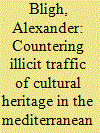

|
|
|
|
|
| Publication |
2010.
|
| Summary/Abstract |
Some of the most thrilling movies of all time depict imaginary or real thefts of artifacts from well-known museums. Topkapi (1964) is about the theft of the Ottoman Sultan's jewel-encrusted dagger from the Istanbul Museum; Entrapment (1999) is about the world's greatest art thief and his plans for the theft of a highly secured piece of artwork. More realistically, most people tend to turn to a news report on art stolen or recovered before they read their usual daily dose of hard news. Art and artifacts definitely capture the collective imagination. Art is usually viewed as the better dimension of human personality, while art thieves often enjoy a degree of infamy not usually associated with other kinds of felonies.
|
|
|
|
|
|
|
|
|
|
|
|
|
|
|
|
| 4 |
ID:
164918
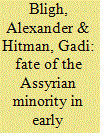

|
|
|
|
|
| Summary/Abstract |
Analyzing ethno-national conflicts is usually not easy in that not all quantitative scientific tools are useful to the student of a conflict based on primordial elements. The burden of studying the outcome of a conflict is all the more complex given that the two conflicting groups might be at two different stages of their political development at any given time during the course of the conflict. In the case of the fate of the [Eastern Christian] Assyrian community in early independent Iraq, the political rationale for decisions taken by each party was drawn from different sociological, historical and political realms. Decisions in times of conflict and their political and historical ramifications are not always rational, since they draw upon primordial/communal considerations rather than the accurate reading of the overall true strategic scene.
|
|
|
|
|
|
|
|
|
|
|
|
|
|
|
|
| 5 |
ID:
118383
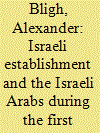

|
|
|
|
|
| Publication |
2013.
|
| Summary/Abstract |
It is impossible to assess the Israeli government activity vis-à-vis the Israeli Arabs during the 1987-92 uprising in the West Bank and Gaza as a success. In terms of policies of active initiative, there were none. Two ministers did take active measures in addressing the development gaps, but that did not deal with the issue of preventing the emergence of a de facto Israeli Arab autonomous system. In shaping passive policies, the response was far from conveying the message to the Israeli Arabs that as full Israeli citizens they were expected to keep a distance from organizations dedicated to the destruction of the Jewish state.
|
|
|
|
|
|
|
|
|
|
|
|
|
|
|
|
| 6 |
ID:
118380
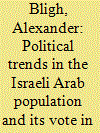

|
|
|
|
|
| Publication |
2013.
|
| Summary/Abstract |
Full Arab Israeli involvement in the national political system is disappearing from the Israeli political scene. A parallel system is being developed by the community's political leaders. Within this new structure, national elections and the Knesset are viewed as marginal; they serve mainly as a PR arena intended to bring the Arab Israeli message to Jewish/Zionist awareness. Judging from the evidence of recent election results among Arab voters, it is possible to cautiously conclude that the Israeli Arab political stance is less and less a part of the general Israeli political culture.
|
|
|
|
|
|
|
|
|
|
|
|
|
|
|
|